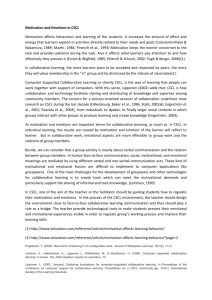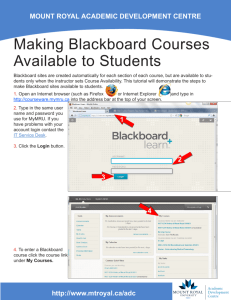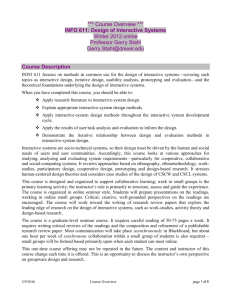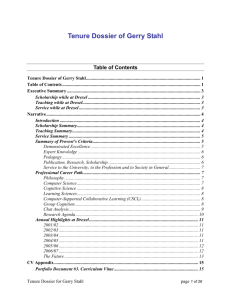Course Overview
advertisement
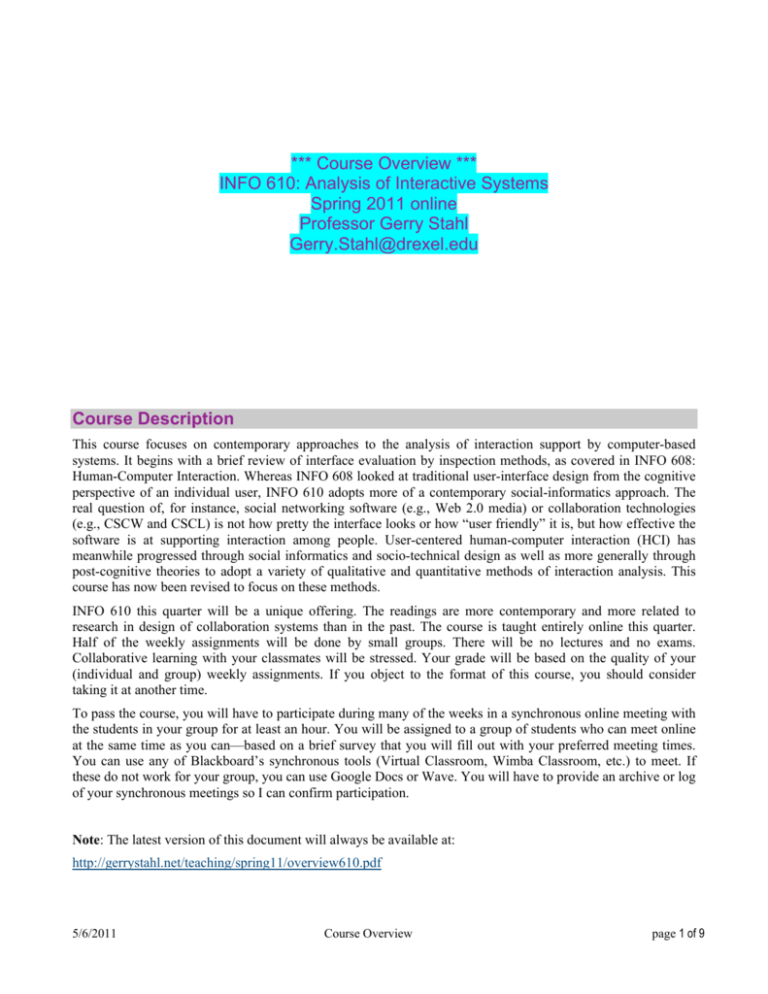
*** Course Overview *** INFO 610: Analysis of Interactive Systems Spring 2011 online Professor Gerry Stahl Gerry.Stahl@drexel.edu Course Description This course focuses on contemporary approaches to the analysis of interaction support by computer-based systems. It begins with a brief review of interface evaluation by inspection methods, as covered in INFO 608: Human-Computer Interaction. Whereas INFO 608 looked at traditional user-interface design from the cognitive perspective of an individual user, INFO 610 adopts more of a contemporary social-informatics approach. The real question of, for instance, social networking software (e.g., Web 2.0 media) or collaboration technologies (e.g., CSCW and CSCL) is not how pretty the interface looks or how “user friendly” it is, but how effective the software is at supporting interaction among people. User-centered human-computer interaction (HCI) has meanwhile progressed through social informatics and socio-technical design as well as more generally through post-cognitive theories to adopt a variety of qualitative and quantitative methods of interaction analysis. This course has now been revised to focus on these methods. INFO 610 this quarter will be a unique offering. The readings are more contemporary and more related to research in design of collaboration systems than in the past. The course is taught entirely online this quarter. Half of the weekly assignments will be done by small groups. There will be no lectures and no exams. Collaborative learning with your classmates will be stressed. Your grade will be based on the quality of your (individual and group) weekly assignments. If you object to the format of this course, you should consider taking it at another time. To pass the course, you will have to participate during many of the weeks in a synchronous online meeting with the students in your group for at least an hour. You will be assigned to a group of students who can meet online at the same time as you can—based on a brief survey that you will fill out with your preferred meeting times. You can use any of Blackboard’s synchronous tools (Virtual Classroom, Wimba Classroom, etc.) to meet. If these do not work for your group, you can use Google Docs or Wave. You will have to provide an archive or log of your synchronous meetings so I can confirm participation. Note: The latest version of this document will always be available at: http://gerrystahl.net/teaching/spring11/overview610.pdf 5/6/2011 Course Overview page 1 of 9 Course Readings The course content is presented by the readings. Students are expected to read them carefully, take notes and be critical. The reading assignments are listed below. All the readings are available for download from Course Documents in Blackboard. Week 1: Artifact Inspection Analysis Reading 1A: Norman, D. (1990). The design of everyday things. New York, NY: Doubleday. Chapter 1. Reading 1B: Norman, D. (1990). The design of everyday things. New York, NY: Doubleday. Chapter 5. Reading 1C: Preece, J., Rogers, Y., & Sharp, H. (2007). Interaction design: Beyond human-computer interaction (2nd ed.). New York, NY: John Wiley & Sons. Chapter 8. Week 2: Ethnographic Observation Analysis Reading 2A: Blomberg, J., M. Burrell, and G. Guest. (2002). An Ethnographic Approach to Design. In: Jacko, J., and A. Sears, (Eds.), The human-computer interaction handbook: Fundamentals, evolving technologies and emerging applications. Mahwah, NJ: Lawrence Erlbaum Associates. Pp. 964-986. Reading 2B: Nardi, B., S. Whittaker, and E. Bradner. (2000). Interaction and Outeraction: Instant Messaging in Action. Proceedings CSCW '00, December 2-6, 2000, Philadelphia, PA. Pp. 79-88. Week 3: Social-informatics Analysis Reading 3A: Orlikowski, W. (1992). Learning from Notes: Organizational issues in groupware implementation. Paper presented at CSCW '92. Toronto, Canada. Proceedings pp. 362-369: ACM. Reading 3B: Kling, R. (1999). What is social informatics and why does it matter? D-Lib Magazine. 5(1). Week 4: Coding Analysis Reading 4A: Gunawardena, C. N., Lowe, C. A., & Anderson, T. (1997). Analysis of a global online debate and the development of an interaction analysis model for examining social construction of knowledge in computer conferencing. Journal of Educational Computing Research. 17, 397-343. Reading 4B: Weinberger, A., & Fischer, F. (2006). A framework to analyze argumentative knowledge construction in computer-supported collaborative learning. Computers & Education. 46(1), 71-95. Reading 4C: Chi, M. T. H. (1997). Quantifying qualitative analyses of verbal data: A practical guide. Journal of the Learning sciences. 6(3), 271-315. Week 5: Conversation Analysis Reading 5A: Stahl, G. (2006). Group cognition: Computer support for building collaborative knowledge. Cambridge, MA: MIT Press. Chapter 12. Reading 5B: Stahl, G. (2006). Group cognition: Computer support for building collaborative knowledge. Cambridge, MA: MIT Press. Chapter 13. Week 6: Interaction Analysis Reading 6A: Jordan, B., & Henderson, A. (1995). Interaction analysis: Foundations and practice. Journal of the Learning Sciences. 4(1), 39-103. Reading 6B: Stahl, G., Ou, J. X., Çakir, M. P., Weimar, S., & Goggins, S. (2010). Multi-user support for virtual GeoGebra teams. Paper presented at the First North American GeoGebra Conference. Ithaca, NY. 5/6/2011 Course Overview page 2 of 9 Reading 6C: Stahl, G., Rosé, C. P., & Goggins, S. (2010). Analyzing the discourse of GeoGebra collaborations. Paper presented at the First North American GeoGebra Conference. Ithaca, NY. Reading 6D: Stahl, G., Rosé, C. P., O'Hara, K., & Powell, A. B. (2010). Supporting group math cognition in virtual math teams with software conversational agents. Paper presented at the First North American GeoGebra Conference. Ithaca, NY. Reading 6E: Stahl, G. (2006). Supporting group cognition in an online math community: A cognitive tool for small-group referencing in text chat. Journal of Educational Computing Research (JECR) special issue on cognitive tools for collaborative communities. 35(2), 103-122. Week 7: Design-Based Research Analysis Reading 7A: Barab, S., & Squire, K. (2004). Introduction: Design-based research: Putting a stake in the ground. The Journal of the Learning Sciences. 13(1), 1-14. Reading 7B: Suthers, D., et al. (2011). Towards productive multivocality in the analysis of collaborative learning. Workshop to be presented at the international conference on Computer Support for Collaborative Learning (CSCL 2011). Hong Kong, China. Week 8: Socio-technical Analysis Reading 8A: Dyke, G., et al. (2011). Towards academically productive talk supported by conversational agents. Paper presented at the Alpine Rendezvous 2011. La Clusaz, France. Reading 8B: Cress, U. & Kimmerle, J. (2011). Successful knowledge building needs group awareness: Interaction analysis of a 9th grade CSCL Biology lesson. Paper presented at the Alpine Rendezvous 2011. La Clusaz, France. Reading 8C: Stahl, G. (2011). Interaction analysis of a biology chat. Paper presented at the Alpine Rendezvous 2011. La Clusaz, France. Reading 8D: Howley, I., et al. (2011). Gaining insights from sociolinguistic-style analysis for redesign of conversational-agent-based support for collaborative learning. Paper presented at the Alpine Rendezvous 2011. La Clusaz, France. Week 9: Group Cognition Analysis Reading 9A: Stahl, G., Zhou, N., Cakir, M. P., & Sarmiento-Klapper, J. W. (2011). Seeing what we mean: Coexperiencing a shared virtual world. Paper to be presented at the international conference on Computer Support for Collaborative Learning (CSCL 2011). Hong Kong, China. Reading 9B: Stahl, G. (2011). The structure of collaborative problem solving in a virtual math team. Paper presented at the iConference 2011. Seattle, WA. Week 10: Theories for Analysis Reading 10A: Stahl, G. (2012). Theories of collaborative cognition. In S. Goggins & I. Jahnke (Eds.), CSCL at work. New York, NY: Springer. Reading 10B: Stahl, G. (2010). Group cognition as a foundation for the new science of learning. In M. S. Khine & I. M. Saleh (Eds.), New science of learning: Cognition, computers and collaboration in education. (pp. 23-44). New York, NY: Springer. 5/6/2011 Course Overview page 3 of 9 Course Schedule Week Dates Topics Assignments 1 Mar 28-Apr 3 Artifact inspection analysis Inspection analysis of interactive artifacts (individual assignment) 2 Apr 4-10 Ethnographic observation analysis Ethnographic analysis of a library as an interactive system (individual assignment) 3 Apr 11-17 Social-informatics analysis Social-informatics discussion of Blackboard (individual assignment) 4 Apr 18-24 Coding analysis 5 Apr 25-May 1 Conversation analysis Review of reading (group assignment) 6 May 2-8 Interaction analysis Solve problem in VMT (group assignment) 7 May 9-15 Design-based research analysis Analysis of trace data from a collaborative learning experiment (individual assignment) 8 May 16-22 Socio-technical analysis Revised analysis of trace data from a collaborative learning experiment (group assignment) 9 May 23-29 Group cognition analysis Analysis of a chat log from Team C (group assignment) 10 May 30-Jun 5 Theories for analysis Analysis of a chat log from Team B (individual assignment) 11 Coding of a Blackboard discussion (group assignment) No exam Due dates: All course assignments are due by midnight (East Coast time) on Sunday at the end of the week shown on the Course Schedule table above. Course Assignments Readings The readings for weeks 1 through 10 are available in the Course Documents in Blackboard. Read the assigned papers carefully in the beginning of each week—do not fall behind the schedule of readings above. Take notes. Think about the main purpose of each paper and its central points. How does it make its argument to support its main points? What terms, concepts, ideas, techniques, or arguments are unclear? How is the argument of the paper supported by data and analysis of the data? What are the implications for the design and analysis of interactive systems? Week 1: Artifact Inspection Analysis Assignment 1: Inspection analysis of interactive artifacts (individual assignment) 5/6/2011 Course Overview page 4 of 9 Review Don Norman's book, The Design of Everyday Things. Post two examples of good and/or bad design from your own experience. The examples can be from any type of technology, digital or non-digital. Provide a short description of why you think this is a good or a bad design. You may include an image (digital camera or camera-phone image, screenshot, etc.). You must explain your examples with specific references to Norman's book. For each example, you must explicitly reference, define, and explain one or more of Norman's ideas. Week 2: Ethnographic Observation Analysis Assignment 2: Ethnographic analysis of a library as an interactive system (individual assignment) Review the readings on ethnographic observation. Then, visit a public library—if possible the central library— where you live. Spend about two hours exploring the different public areas of the library. We may conventionally think of libraries as places to borrow books from, but you will see that there are all sorts of other activities as well, including multimedia libraries, children's areas, special collections, cafes, performance spaces, archives, and so on. When you have finished your observation, as soon as you can, write up your notes, and then compile an ethnographic report of at least 500 words that describes the library, the behaviors that occur in that site, how people interact with the library's services, perhaps with each other, and with the space in general. You can add photos or sketches. Post your report to the Blackboard Discussion Board. Week 3: Social-informatics Analysis Assignment 3: Social-informatics discussion of Blackboard (individual assignment) This week we will discuss the design of Blackboard as an interactive system. Consider the various components of Blackboard and how they work together. How well does Blackboard support collaboration in this class and other courses at the iSchool? What are the social-informatics issues associated with its adoption, dissemination and use at the iSchool? What would be involved in replacing it with a completely new system for online or blended classes? In order to have a good class discussion, please post at least one idea early in the week, post at least one response to the discussion in the middle of the week, and post at least one summary or conclusion note near the end of the week. Week 4: Coding Analysis Assignment 4: Coding of a Blackboard discussion (group assignment) Meet online with your group and prepare a coding analysis of last week’s Blackboard discussion. Use the categories from this week’s readings to code individual posts. What does this tell you about how well the Blackboard discussion worked to build group knowledge in the class? Post an analysis about 400-500 words and attach a log with your coding. At the top of your group report (this week and in future weeks) list the names of the people who contributed to the analysis. At the bottom of your group report (this week and in future weeks) include a link or pointer to a log or archive of your group synchronous discussion about the analysis. Week 5: Conversation Analysis Assignment 5: Review of reading (group assignment) Meet with your group online to draft a review of the chapters assigned for this week. You might want to each post ideas for the review to a group asynchronous space in advance of meeting; then meet synchronously for about an hour to discuss how to put the ideas together and to develop them further; then polish the review and agree on it as a group asynchronously; and finally post it to the Blackboard Discussion Board by the end of the week. Be concise and to the point: your group reviews should be about 400-500 words long; they should state the main idea or argument of the reading and should point out its value and its limitations. What are the chapters trying to accomplish—within the book and within the CSCL scientific community; how does their rhetorical and literary style help or hinder this? What did you learn about the nature of small-group interaction and about how to analyze it. Do not simply state opinions; back up your claims or arguments with references to the data or to the detailed wording of the chapters. 5/6/2011 Course Overview page 5 of 9 Week 6: Interaction Analysis Assignment 6: Solve a problem in VMT (group assignment) Prior to your group’s meeting time, try to enter your group’s VMT chat room to make sure your computer is properly set up for it. Meet with your group online at an agreed upon time in your group’s VMT chat room. Do not read or work on the topic until all your group members are ready to work together on it. Discuss the mathematical Topic given in the chat room for about an hour. Discuss your approach and each step in the chat— do not divide up the work and do it individually. The VMT Lobby is at http://vmt.mathforum.org/VMTLobby. You have already been registered as a member of the “INFO610” community. Your username is the concatenation of your first and last names (e.g., the user name for John Smith would be “john_smith”). The usernames are not case sensitive. Your initial password is “INFO.” You can edit your account by using the Edit Profile tab on the My Profile page. Week 7: Design-Based Research Analysis Assignment 7: Analysis of trace data from a collaborative learning experiment (individual assignment) Select the log of one of the groups of biology students. A spreadsheet with several logs is in the Blackboard Course Documents. What do you think is going on in the group interaction? What would be a good approach to analyze this in detail and with arguments based on objective evidence? Conduct some analysis yourself and draw some conclusions about how well the students are building knowledge together about biology. Can you draw any conclusions about how to redesign the experiment or the technology to improve the student learning experience? Post a report of about 400 words on your analysis to the Discussion Board. Week 8: Socio-technical Analysis Assignment 8: Revised analysis of trace data from a collaborative learning experiment (group assignment) As a group, select the log that one of you analyzed last week. What do you now (as a group) think is going on in the group interaction? What would be a good approach to analyze this in detail and with arguments based on objective evidence? Conduct some analysis of this log as a group and draw some conclusions about how well the students are building knowledge together about biology. Draw some conclusions about how to redesign the experiment or the technology to improve the student learning experience. Post a report of about 600 words on your group analysis to the Discussion Board. Week 9: Group Cognition Analysis Assignment 9: Analysis of a chat log from Team C (group assignment) As a group, select an excerpt from the log of Team C that you would like to analyze. The entire log is in the Blackboard Course Documents. Select an excerpt that has not been analyzed in any of the readings. What do you (as a group) think is going on in the group interaction? What would be a good approach to analyze this in detail and with arguments based on objective evidence? Conduct some analysis of this log as a group and draw some conclusions about how well the students are building knowledge together about mathematics. Draw some conclusions about how to redesign the event or the technology to improve the student learning experience. Post a report of about 600 words on your group analysis to the Discussion Board. Week 10: Theories for Analysis Assignment 10: Analysis of a chat log from Team B (individual assignment) As an individual, select an excerpt from the log of Team B (in the Blackboard Course Documents) that you would like to analyze. Select an excerpt that has not been analyzed in any of the readings. What do you think is going on in the group interaction? What would be a good approach to analyze this in detail and with arguments based on objective evidence? Discuss which of the analysis methods presented in the course might be relevant for analyzing this interaction. What are their pros and cons in this context? Do you think some other approach is necessary or potentially helpful? Post a discussion of about 400 words on how to analyze the VMT interactive system in this case. 5/6/2011 Course Overview page 6 of 9 Course Grading Because your classmates will be building on your ideas, it is essential that you post all your assignments on time and that you participate actively in all group activities (both asynchronous and synchronous). Grades will be reduced at least in half for assignments submitted after the deadline (and for most weeks late assignments would not make sense). Grading is not curved: We are trying to build knowledge collaboratively. It is possible for all groups and even all individuals to earn an A in this course. The grading is not competitive, but simply acknowledges the work that you have done on schedule. Most students who take an honest interest in the course and exert reasonable effort in all aspects of the course can receive an A. Failure to do your share in your group work, or to meet deadlines for postings and assignments will lower your grade. Your grade should be a measure of what your group and you have accomplished in this course. Each weekly assignment will be A+ 98 100 worth a maximum of 10 points. A 92 97 A- 90 91 B+ 88 89 B 82 87 B- 80 81 C+ 78 79 C 72 77 C- 70 71 D+ 68 69 D 62 67 D- 60 61 F 0 59 Generic Information Problems & Questions. Please raise questions in the class discussion board if possible. This is the best place to raise questions because other students may have the same question and they can benefit from seeing the answer; also, other students can respond with their views on the issue. If it is an urgent or personal problem, email the instructor. If you believe that your group assignment is not going to work out, discuss it with the instructor by email. Email with the instructor is the best medium for confidential concerns, such as concerns about other students in your group or personal events that will interfere with your course work. No Excuses. No one is interested in excuses. If you need to miss any group activity, notify the instructor and the other members of your group as soon as possible and explain how you will contribute to the group. You are responsible for doing your share of the group work during the term; when you ask others to cover for you, let them know how you will make up for it. Everyone knows that things come up, sometimes unexpectedly, but that does not relieve you of your responsibilities. Your group is your support system in the course—let them know what is going on so they can help you. 5/6/2011 Course Overview page 7 of 9 Plagiarism. Obviously, plagiarism is not tolerated at Drexel and can result in failure. Plagiarism is passing off someone else’s ideas, work or words as your own. Collaboration is encouraged, but always give credit to individuals or groups whose ideas, work or words you are reporting, quoting, or summarizing. Academic Honesty. Cheating, academic misconduct, plagiarism, and fabrication are serious breaches of academic integrity and will be dealt with according to University Policy (Section 10 of the Student Handbook). Students are responsible for their own finished work. Penalties for first offenses range from 0 on an assignment to an F in the course. All offenses are reported to the University Office of Judicial Affairs. Late Policy. All group assignments are due online by midnight (East Coast time) of the due date. Group presentations cannot be rescheduled. Individual written work is due by Blackboard Dropbox to the instructor by midnight of the due date. Grades for late work will be lowered substantially. Student Advisors and Resources. Take advantage of the academic advisors who are available on the third floor of Rush. Appointments with advisors can be scheduled by calling 215-895-2474. Appointments with co-op coordinators can be scheduled by calling 215-895-2185. The Drexel Learning Center is available at http://www.dlc.drexel.edu. The Writing Center is available at http://www.drexel.edu/writingcenter. The Hagerty Library is available at http://www.library.drexel.edu. Special Needs Students. If you have any special need that must be accommodated, please let the instructor know the first week of class. Contact with the Office of Disability Services (215) 895-2506/7) is strictly confidential. Privacy Notice In general, all work and communication in this course should be treated as public: • Your work in this course may be studied by other students in the course. • Any communication on the Internet may end up being seen by people for whom it was not originally intended. • The web spaces for this course may be viewed by anyone in the world through the Web. • iSchool courses may be recorded and streamed for educational purposes. Presentations and other activities in class may be videotaped and made available in the future. • The instructor and other Drexel faculty, students, and staff may have access to anything in Blackboard or other course web spaces. • Future researchers may have access to these materials as data. Although they do not have permission to publish any personal data about you and although they should ensure anonymity and confidentiality of all personal data, you should assume that activities taking place in this course might be subject to viewing. • Students in future courses may have access to your work. Please let the instructor know if you have an objection to your work being made available to others. 5/6/2011 Course Overview page 8 of 9 Instructor's Background Hi. My name is Gerry Stahl. I am always available by email at Gerry.Stahl@drexel.edu. Send me an email if you want to meet with me in person or to inquire about urgent or personal questions. My professional research area is the field of CSCL (Computer-Supported Collaborative Learning). I think that collaborative learning is an exciting and especially effective way to learn. I believe that there is great potential to design good computer support for it. I have been experimenting with a number of CSCL prototypes and have written many papers on the theory, design, and analysis of interactive systems to support collaborative learning. We will be taking advantage of what I have learned from my research in this course, and I hope you will benefit from this. In 2006 I published a book on CSCL entitled Group Cognition: Computer Support for Building Collaborative Knowledge and launched the International Journal of Computer-Supported Collaborative Learning. In 2009 I published Studying Virtual Math Teams, a book on the VMT Project that I direct at the iSchool. I have published over 200 conference papers, journal articles, book chapters and essays. My background is in computer science and philosophy. At Drexel, I teach mainly HCI courses; before coming to Drexel, I worked at a large research organization in Germany; before that I was a Research Professor at the University of Colorado in Boulder. The 2002 international CSCL conference was at Boulder and I was the Program Chair for it; I have been in charge of workshops at CSCL 2003 in Norway, CSCL 2005 in Taiwan, ICCE 2006 in Beijing, CSCL 2007 in New Brunswick, and CSCL 2009 in Greece; I am a Program co-Chair for CSCL 2011 in Hong Kong. Let me know if you have any questions about my background or check out my home page, where you can see more details and read my papers: http://GerryStahl.net. You can download my reflections on “A Career in Informatics” at: http://GerryStahl.net/personal/career.pdf. 5/6/2011 Course Overview page 9 of 9

